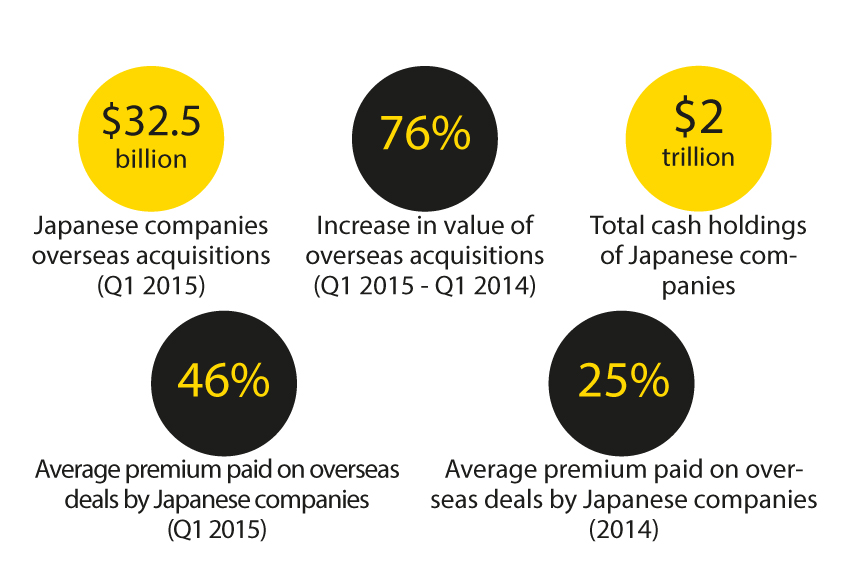With an almost pedantic obsession with quality and efficiency to strict environmental standards and an uncompromising commitment to giving back to society, Japan is leveraging centuries-old virtues that are at the core of its culture to expand internationally

The recent Toshiba accounting scandal has seriously damaged the global reputation of one of Japan’s most renowned companies. But the sense of outrage and bewilderment is far greater in Japan, where for the majority of corporations, betraying the customers and shareholders who sustain a business is just short of unthinkable – not just in terms of the paradigms of responsible corporate governance, but in the unwritten codes of individual honor on which they are based.
Contrary to what many suppose, Japanese companies are not just driven by profit. The private sector has a more than bottom-line interest in adhering to principles of high quality, high efficiency, attention to detail, responsible business practices, attention to the environment and the idea of giving back to society.
Take Toyobo, one of around 470 companies that Shibusawa Eiichi, the father of Japanese capitalism, helped to set up and supervise. Apart from introducing Western business practices to Japan, Mr. Shibusawa, whose life was guided by Confucian principles of harmony and justice, insisted that good ethics make for good business. “That’s one thing we have never lost sight of,” says the current president, Seiji Narahara. “It is still in our DNA and still our basic vision and policy.
Today we continue our goal to help and serve society and as a result maybe earn some money and be profitable.”
Century Tokyo Leasing Corporation is another company that is guided by Mr. Shibusawa’s philosophy. “We are constantly keeping Eiichi Shibusawa in our minds,” says President and CEO Shunichi Asada. “His thinking – that the business and ethics must always come together – has formed the basis of our corporation. We have felt such a combination is very important.”
A philosophy that has served businessman Toshifumi Suzuki well revolves around embracing change. He believes in succeeding in business by accepting change when it comes along and leveraging it until it becomes an opportunity. This philosophy has helped him to build Seven & i Holdings into the world’s fifth largest retail group, with operations in over 100 countries.
The group’s name recalls Seven Eleven, the US-based chain of convenience stores, superstores, financial service providers and other corporate clusters specializing in “comprehensive consumer lifestyles.” Mr. Suzuki worked for the company’s Japanese affiliate at the start of his career. In 2005, he acquired control of the US retailer in a stock swap.
“The most important thing for us is to be able to adapt to change,” says Mr. Suzuki. “There are so many things we can anticipate about, what is going to happen one year from now, but rather than trying to forecast and deal with them in advance, the point is to maintain a willingness to adapt to them.”
By way of example, he points to the well-known fact that Japan’s population is rapidly aging. “Elderly people may find it difficult to do their shopping, so having convenience stores in the neighborhood close by will make it easier for them. Further on, maybe even going to the convenience store is going to be difficult, in which case we can offer delivery options. Hence, these are all opportunities of one sort or another.”
With a presence in over 150 countries, LIXIL Group is aware of the need to diversify and open new markets. But the president and CEO, Mr Yoshiaki Fujimori, is above all, a firm believer that the inclusion of women in the corporate sphere is a vital necessity.
Women’s intelligence and perspectives have to be harnessed, he says, in order for Japan to grow as an economy. “That, I think, gives us an engine for growth, an engine for innovation, an engine for more energy for the entire country. Women have been extremely underutilized, their power taken for granted,” he adds.
“From the economic revitalization perspective, Prime Minister Abe is encouraging women to work, pushing for greater diversity. I think this is an area where the private sector has to make two or three times the effort because I truly believe women will play a fundamental role in a revitalized Japan,” Mr. Fujimori contends.
TOTO believes the fight against global warming begins on the home front. “In regards to our global environmental vision, TOTO is dedicated to helping to combat global warming. We have been adopting innovative manufacturing methods and supply chain innovations, while expanding our existing efforts to reduce CO2 emissions through water conservation and energy saving. The entire TOTO Global Group is deeply committed to making people’s lives better, protecting the planet, and keeping our water pure,” says company president Madoka Kitamura.
A cruet of Kikkoman soy sauce is a common item on supermarket shelves and dinner tables in over 100 countries, especially in America. For over 300 years, the condiment has been produced and brought to market by 19 generations of the Mori family. “Every one of them has learned by heart the 16 guiding principles of the family business and number 15 on the list is “give back to society as much as you can,” says Yuzaburo Mogi, the company’s Honorary CEO and Chairman of the Board.
Since 1993, the Kikkoman Foods Foundation has been active in Walworth, the Wisconsin town chosen as the base for its U.S. operations. Sponsored activities include awarding college scholarships, underwriting new diagnostic equipment for local hospitals, or community organizations like the Girl Scouts. Mr. Mogi says, “We are trying to be good corporate citizens; we not only want to do business but contribute to society as much as possible.”
0 COMMENTS